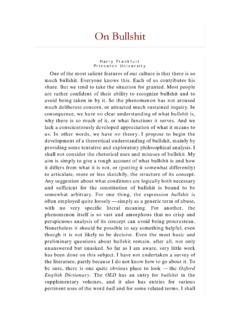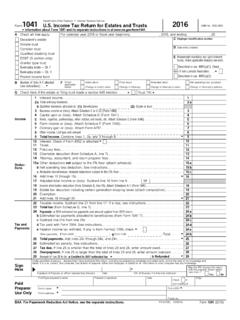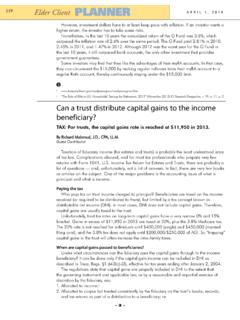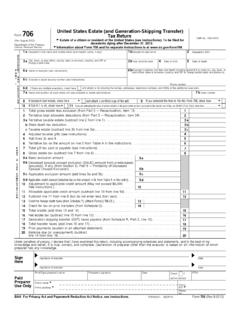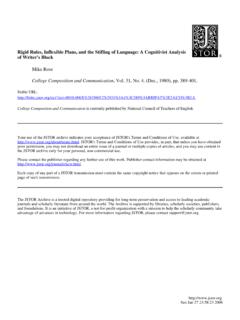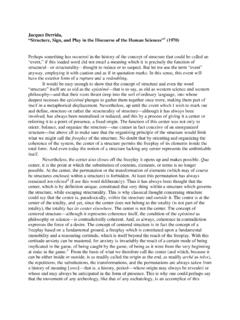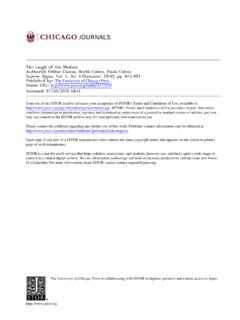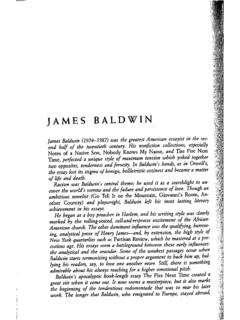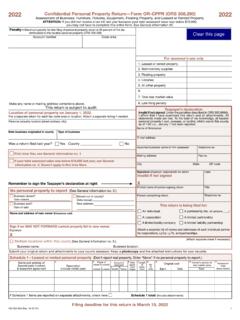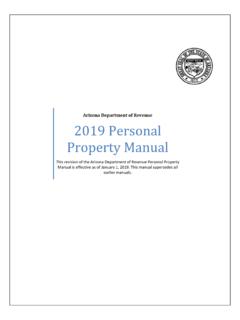Transcription of When is an irrevocable trust’s income taxable in California?
1 - 11 -Spidell s california Taxletter 1, 2014 When is an irrevocable trust s income taxable in California? Certain rules apply to california , but each applicable state s rules will need to be Richard B. Malamud, , , CPAG uest ContributorWhen a california resident with a revocable living trust dies, what was once a grantor trust taxable to the resident becomes an irrevocable trust with future income reported on a fiduciary return. The income from the trust assets is either taxable to the trust or to the beneficiary. Often, the trust becomes an administrative trust until the beneficiaries receive their inheritance or trusts established by the living trust are funded, such as a QTIP, an exemption trust, or a trust for the children or grandchildren.
2 How are these irrevocable trusts and others trusts taxed by california ? TrusteesIn general, california provides that all of the trust s taxable income (the income not distributed to the beneficiaries) is taxable in california if the trustees are all california residents. If there are multiple resident and non-resident trustees, california taxes all california -source income , plus the percentage of other income based on the ratio of the number of california trustees to the total number of none of the trustees are california residents, california will tax the trust s california -source income , plus all the other taxable income if all non-contingent beneficiaries are california If there are multiple resident and nonresident non-contingent beneficiaries.
3 california will tax the california -source income plus the percentage of other income based on the ratio of california non-contingent beneficiaries to total non-contingent A non-contingent or vested beneficiary is someone who has an unconditional interest in the trust income or corpus. A resident beneficiary of a discretionary trust has a non-contingent interest if the distribution is at the trustee s Unlike some other states, the domicile of the decedent does not determine california situs. Thus, where a california resident dies and there is both a nonresident trustee and nonresident beneficiary, unless the trust contains california property (usually real estate or a business), the trust would not be subject to filing and payment of tax to california .
4 Capital gains retained by the trust would not be taxable in california unless the gain is from the sale of california real or tangible personal : In the case of a corporate trustee, its residence is the place where the corporation transacts the major portion of its administration of the The Franchise Tax Board sought legislation to repeal this, due to the complexity of determining the location of a multistate corporate trustee. It unsuccessfully proposed to simply tax trusts based on the residence of the : If all the income is distributed to the beneficiaries, the beneficiaries pay tax on the income . Resident beneficiaries pay tax on income from all sources. Nonresident beneficiaries are taxable on income sourced to 12 -Spidell s california Taxletter 1, 2014 Although there is no case law or guidance from the FTB, a common situation occurs when a california surviving spouse who is both the sole trustee and sole beneficiary of the predeceased spouse s QTIP or exemption trust dies and the successor trustee/beneficiary is not a california resident.
5 There is simply no guidance if they are considered two trustees and two beneficiaries for the year, or if the year-end determination is made based on their status at that time. In the case of a grantor trust that became irrevocable on the death of the grantor, only the successor trustee probably should be counted. In the case of an existing exemption trust in the year the trustee/beneficiary dies, both trustees should be and nonresidents trustees and beneficiariesAs stated above, if all the trustees are california residents or all the non-contingent beneficiaries are california residents, then all the trust s income is taxable in california . It is far more complicated when there are both resident and nonresident trustees and beneficiaries.
6 This was addressed by FTB Legal Ruling No. 238 (October 27, 1959), which provides the method for allocating non- california source income where there is a mixture of california resident and nonresident fiduciaries, and california resident and nonresident non-contingent Form 541, Schedule G must be completed to determine what percentage of the trust s income is taxable in california . The trust s taxable income does not include amounts distributed to a beneficiary who pays tax. The allocation of the trust s california taxable income is best explained by using an example and the chart from Schedule G (see box below).How to allocate non california source incomeTotal taxable income of the trust is $90,000 that is not sourced to california .
7 There are three trustees, one of whom is a resident of california and two non-contingent income beneficiaries, one of whom is a resident of california . There was no distribution of income to the beneficiaries. The amount of income taxable by california is calculated in the following steps: First, the $90,000 income is allocated to california based on the ratio of california trustees to total trustees: $30,000 (1/3 of $90,000).Second, the remainder, $60,000 ($90,000 - $30,000) is then allocated based on the ratio of the number of california non-contingent beneficiaries to the total number of non-contingent beneficiaries: $30,000 (1/2 of $60,000). This produces income taxable by california of $60,000 ($30,000 + $30,000). income AllocationABCDEFType of IncomeCA SourceNon-CA Source CA Trustees B Total TrusteesRemaining Non-CA source = B - C CA Beneficiaries D Total BeneficiariesCA IncomeA + C + E$90,000 of interest$90,0001/3 $90,000 = $30,000$90,000 - $30,000 = $60,000 $60,000 = $30,000$0 + $30,000 + $30,000 = $60,000 EXAMPLE 6-6: Bill, a Nevada resident, is the trustee and beneficiary of a trust his california resident mother established for him.
8 The only assets the trust contains are publicly traded stocks. The trust will not be a california trust and any income retained by the trust will not be subject to any state s tax (since Nevada does not have an income tax).- 13 -Spidell s california Taxletter 1, 2014 california trust and a nonresident beneficiaryWhenever there is a trust, there are two potential taxpayers: the trust and at least one beneficiary. Beneficiaries are taxed on the amounts paid to them (or required to be paid to them) during the year. The trust receives a distribution deduction in the same amount. The trust s taxable income is limited to the amount not distributed. If the trust is a simple trust (such as a QTIP trust), all income is required to be distributed each year and therefore the trust s taxable income would be limited to the capital gains for the year.
9 This is the case for most simple trusts where all income is taxed to the beneficiary, but capital gains are not distributed. Just because a california trust distributes income to a beneficiary does not mean it will be subject to tax in the state. A nonresident beneficiary of a california trust is only taxed on california -source income and is not taxed on non- california -source income , such as interest and california s Other State Tax Credit If a california trust has income from another state, such as rental real estate income that is taxed both to the state where the property is located and to california , the trust may claim a credit against its california tax, based on the net income tax paid to other states by the estate or trust on Schedule S.
10 Given the lack of state uniformity, the credits may not totally offset the double income rule is (unfortunately) alive and well in CaliforniaCalifornia has, in effect, a retroactive tax on california beneficiaries who receive trust distributions if: The trust has been non-compliant in paying california income taxes previously due; or The beneficiary currently receives income that was not previously taxed in california because the beneficiary had a contingent interest at the time it was The accumulated net income is taxed over the shorter of the accumulation period or five years. The tax is calculated on Form 541, Schedule J. Possible to avoid accumulation?Why not accumulate income in a non- california trust and then, in the year of distribution, have a california resident leave the state to avoid the california tax?
